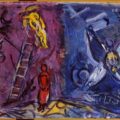The History of the Wanderer

When I was four my family moved from our modest ranch house in Florissant, Missouri, to a larger two story home on an acre of land in Fairfax, Virginia. This was the 1970s, and children were given a lot of freedom as long as we kept to the rules and boundaries established by our parents. In other words, we didn’t even have to keep the rules—we just couldn’t get caught breaking them.
Our house was at the end of a subdivision behind which were woods and old cabins, meandering trails and creeks, empty fields and farms. Past the forest was the Farmer’s Field, where, it was rumored, we would be shot if we stepped on the farmer’s property. Across the street, behind our neighbor’s house and more woods, was Tribby’s Field, another semi-abandoned farm area with a working well, from which if we fell in we’d never emerge.
Despite our natural freedom, everywhere there existed boundaries, places where natural human curiosity was enclosed.
· · ·
In Paradise Lost, wandering is associated with the medieval romance, the chivalric knight, the wandering hero. In Milton’s epic poem, the meaning of the word locates itself on a continuum from spatial directionless to error, or a straying from the law. In Book Two, Satan, despairing his lot, laments, “Those full of pain, this intellectual being, Those thoughts that wander through eternity.” Echoing the Areopagitica, the concept of wandering becomes intellectualized: “minds that wander beyond all thought and satiety.” It has been suggested that this intellectual wandering relates to the ability to read and think without a path or plan, an idea Milton seems to have supported.
In Book Nine, Eve disappears after a disagreement with Adam. She wanders in the garden, and meets the serpent. Adam afterwards admonishes her, “Would thou hadst hearkened to my words and stayed / With me as I besought thee when that strange / Desire of wandering this unhappy morn / (I know not whence) possessed thee.” For Eve—and by deliberate, natural extension on Milton’s part, for all women—wandering contains shades of both “strange” and “possessed,” as if the act were borderline incomprehensible, or madness. Eve, stunned at Adam’s accusation, replies, “Imput’st thou to my default, or will / Of wandering, as though call’st it.” One can hear the air quotes when Eve, incredulous, can’t believe Adam is blaming her for wandering. The word’s darker intonations trap Eve, making her culpable; and as punishment, or perhaps as a kind of contraception, Eve is no longer free to wander. It is for her “own good” that she be constrained by the all-observing God and his first likeness, Adam.
Eve serves as a powerful template for the literary woman wanderer since Milton. Women, it is presumed, ought to remain under a watchful eye; once they wander outside constraint, it becomes a dangerous act, an insurrection against the natural order. A wandering woman not only strays from her prescribed role as mother and spouse, she puts to question the roles themselves. In Jane Austen’s Pride and Prejudice, Elizabeth Bennett begins the novel with purposeful walks, such as when she travels to visit her ailing sister, or goes out to read letters and reflect. In her essay, “The Path Out of the Garden,” Rebecca Solnit notes that “these solitary walks express the independence that literally takes the heroine out of the social sphere of the houses and their inhabitants, into a larger, lonelier world where she is free to think: walking articulates both physical and mental freedom.”
Elizabeth desires the same physical and intellectual freedom that Eve expressed, naturally, in Paradise Lost. Elizabeth, significantly, falls in love with Darcy after she is given a tour of his estate, and later tells her sister, “I believe I must date it [falling in love with Darcy] from my first seeing his beautiful grounds at Pemberley.” As Solnit notes, “It is not Mr. Darcy but Pemberley, his estate, that begins to change her mind about him, and walking in his park becomes a peculiarly intimate act.” Elizabeth falls in love with the grounds of Pemberley, and as an extension Mr. Darcy. At Pemberley she is allowed to wander—within limits, and with constraints—but also without the grim repercussions of her sister Lydia’s sexual wandering, which culminates in a ruined reputation and bad marriage.
Toward the end of the novel, when Elizabeth and Mr. Darcy finally go out alone, they’re able to admit their mutual love. Upon their return, they are chastised for being late; when Elizabeth is asked where she was, “She only had to say in reply, that they had wandered about, till, she was beyond her own knowledge.” It’s a queer turn of phrase and a clear biblical echo. The novel ends neatly for Elizabeth—she is rewarded with a good and rich husband and an estate she can enjoy the rest of her life—but this crucial moment hints that wandering could have led to confusion and disassociation. Women, as symbolized by Eve, apparently should not follow desire, curiosity, or self-direction too far. Elizabeth’s modest redemption of wandering sends a familiar message with it: do not stray from the expectations of society for too long.
· · ·
In the fifth grade, my girlfriends and I decided, unannounced, to explore an unpaved dirt road we’d heard connected their neighborhood to mine. When we arrived at my house an hour or so later, my parents were waiting, furious and frightened. While we tried not to show how much fun we’d had on our adventure, my parents were on the phone with my girlfriends’ parents, letting them know we were safe. “Why had we gone off like that without telling anyone?” they asked. That it hadn’t occurred to us to tell anyone did not suffice.
Our parents worried about us not just as children, but as girls especially. Empty dirt roads surrounded by forests are places where, under the wrong circumstances, young girls disappear. We were unaware of such dangers, alert only to the excitement an unplanned journey could offer. It was difficult to understand why the adults were so worried. But I knew from then on: excessive wandering would be punished.
When I reached high school, my wanderings gradually ceased. In the natural course of aging and shifting interests, the paths, creeks, and fields were erased from my imagination. Then subdivisions of identical houses appeared in my hometown, taking the place of cabins and wells, a place that encouraged evening jogs under bright streetlights. But the lesson of my innocent, wandering youth remained.
In my twenties, I grew acutely aware of the dangers of walking alone, began to avoid dangerous places, worried about getting lost. Because we’d been warned, there existed a prevailing sense that the responsibility was ours alone: if we wandered too far afield and ran into trouble, it would be our own fault.
· · ·
Jane Eyre, published in 1847, takes place before 1820, not long after Pride and Prejudice appeared in 1813. As in Austen’s novel, the term wander appears frequently and in varying forms. The story opens with Jane commenting that “There was no possibility of taking a walk that day. We had been wandering, indeed, in the leafless shrubbery an hour in the morning…” However, a few paragraphs later, she confesses, “I never liked long walks,” especially in the cold weather. This opening gambit—a movement from inability, and supposed disappointment, to willful distaste—foreshadows her own subversive narrative, from first meeting Mr. Rochester, to her wandering with him in the garden, to self-exile and supposed fulfillment, to the final return home to the maimed Rochester, where she is content to stay.
When Jane learns that Rochester’s extensive travel include Jamaica—where he married Bertha, the woman in the attic—she remarks, “I knew Mr Rochester had been a traveler: Mrs Fairfax had said so; but I thought the continent of Europe had bounded his wanderings.” Jane considers Jamaica outside of the safe bounds, perhaps beyond that boundary of self-knowledge. Rochester’s wanderings also suggest a troubled spirit. After Bertha attacks her brother, Mr. Mason, Rochester ushers Jane out to the garden. “Now here (he pointed to the leafy inclosure we entered) all is real, sweet, and pure,” he tells her.
These allusions to Eden are hardly subtle, and it is in this space that Rochester unburdens himself of his secret. “Bitter and base associates have become the sole food of your memory,” he says, “you wander here and there, seeking rest in exile: happiness in pleasure—I mean in heartless sensual pleasure—such as dulls intellect and blights feeling.” Jane later responds, “A wanderer’s repose or a sinner’s reformation should never depend on a fellow creature.” The next day, Jane returns to her own childhood home to care for the dying Mrs. Reed. “I still felt as a wanderer on the face of the earth,” she reflects. Jane and Rochester are bound through their mutual rootlessness, each trapped in a self-imposed exile, searching for home and salvation.
Returning to Thornfield, Jane walks into the “sheltered” and “Eden-like” garden, a place where “one could wander unseen.” But Rochester does see her there, and proposes under false pretenses— echoing Eve’s seduction. Later, when Jane discovers Rochester’s marriage to Bertha, she leaves Thornfield on a “road I had never travelled,” lamenting her “drear flight and homeless wandering.” A few days later, ill and nearing death from exposure, Jane collapses at the door to what will become her first real home. Once she is nursed to better health, she agrees to tell her house dwellers (who she later discovers are her cousins) “the history of the wanderer,” that is, the history of Jane.
Never in Jane Eyre does wandering carry connotations of freedom and virtue, as it does in Pride and Prejudice. Throughout the novel, Jane yearns to cease her wandering and Rochester believes she will provide respite to his own. Before her cousin John goes to India, he blesses Jane, as one looking over “his wandering sheep—or better of a guardian angel watching the soul for which he is responsible.” This is as near as the term comes to virtue. The wandering woman again requires protection, as my friends and I did in my youth, as Eve did in the garden. Facing Rochester once more, now blind and lame from the fire in which Bertha died, Jane fears that he has gone mad. Not so—and the wandering motif is resolved in its final use: “He groped; I arrested his wandering hand, and prisoned it in both mine.” The word is trapped in its own sentence by “arrest” and “prison,” the very antithesis of the (negative) freedom that wandering presents.
But there is another person arrested and imprisoned—Rochester’s wife, Bertha, locked in the attic (according to Jane) for her own good, to contain her madness, to stop her from harming others. Jane’s fear regarding Rochester’s sanity is physically manifested in Bertha. As a Creole in the British colony of Jamaica, Bertha’s identity strays across nations, memory, sanity, and ethnicity in Jean Rhys’ contemporary classic, Wide Sargasso Sea. Positioning itself as a prequel to Jane Eyre, the novel explores the bonded but unbound Antoinette (Bertha), who is declared mad and then forced by her nameless husband to leave the Caribbean for England.
In a notable contrast to the many uses of the word in Jane Eyre, wander is not used significantly in Wide Sargasso Sea, if at all. Yet, perhaps because she and her mother live alone and destitute on the margins of society, Antoinette seems more vividly aware of wandering’s many dangers than any of her literary forebears. She polices herself, careful not to leave her home, which had already fallen into decay. “Our garden was large and beautiful as the garden in the Bible—the tree of life grew there. But it had grown wild.” It’s a stark counterpoint to Rochester’s garden of peace. Antoinette details the smells of death and life in the garden, describing an octopus orchard that bloomed twice a year, “The scent was very sweet and strong. I never went near it.” She is a woman who understands the danger of untamed places, spaces outside of societal control. Her husband, by arranged marriage, comes to hate Antoinette, “for she belonged to the magic and the loveliness” of that untended garden.
To forget the beauty of both his wife and the islands, he tries to erase her and all that she represents. “So we rode away and left it—the hidden place. Not for me and not for her. I’d look after that. She’s far along the road now.” It is not a path that will lead to freedom or enlightenment. It is the road of dissolution, of losing any self that she had. Her husband renames her Bertha, takes her to England, and imprisons her in the attic.
Antoinette / Bertha, at the hands of her husband / Rochester, becomes transformed into a wandering, suffering expatriate, traversing internal space as Rochester does the Atlantic. Rhys has said of her own Jamaican identity, “Am I an expatriate? Expatriate from where?” Since she was forced from her home, Antoinette is more exile than wanderer: unlike Elizabeth, who discovers happiness and achieves a home through well-bounded wandering; unlike Jane, damned to boundless wandering to finally win at a broken home. For Antoinette / Bertha, wandering is internal, sexual, and psychological—until her husband fixes her in a state of untetheredness, “arrested” or “imprisoned;” he erases her identity and seals her in the attic, safe from herself, allowing him to wander the world alone.
Rhys thus turns the prototypical wandering wildness inside-out. What’s inside becomes the wilderness without. A similarly disturbing transformation occurs in Paul Bowles’ novel, The Sheltering Sky. The protagonists, Port and Kit, leisurely travel North Africa in an effort to repair their marriage. But Port takes to late-night wanderings; he has sex with a blind prostitute and later contracts a fatal disease. After his death, Kit wanders “deeper into the empty region which was her consciousness, in an obscure and innermost part of her mind.” In the course of her aimless travels through the Sahara, a group of Bedouin rape and imprison her. Tennessee Williams, in his 1949 review of the novel, writes:
From then on the story is focused upon the continuing and continually more astonishing adventures of his wife, Kit, who wanders on like a body in which the rational mechanism is gradually upset and destroyed. The liberation is too intense, too extreme, for a nature conditioned by and for a state of civilized confinement. Her primitive nature, divested one by one of its artificial reserves and diffidences, eventually overwhelms her, and the end of this novel is as wildly beautiful and terrifying as the whole panorama that its protagonists have crossed.
· · ·
After my husband and I decided not to have children, we quit our stable jobs in Washington, DC, upended our whole lives, and moved to Daegu, South Korea. At the time we thought we’d be away for a year, that we might return to careers and cars and homes in some American city. But instead we decided to stay for another year, and then another, eventually relocating to Seoul. It’s a city that lends itself to aimless walks, with sprawling neighborhoods and delightful discoveries around each corner.
Behind our apartment loomed a mountain with innumerable trails, which meandered and reconnected, providing plenty of opportunities to wander alone. Compared to American cities, Seoul offers safety for women, which allowed me more freedom to explore without recrimination or fear—even at night.
Being a white American woman precluded me from some of the more conservative mores of Korean society. Unlike most Korean women, I wasn’t bound to the injunction against wandering. I had already strayed from Western expectations of an educated, white, thirty-something, so I also lived outside the social world of marriage, house, family, career. Free from both sets of boundaries, my move to South Korea granted a freedom that I would not have found in the United States. It was a surreal experience. No matter how far I wandered, nowhere did I feel outside my own mind.
· · ·
This feeling recurred while reading Nell Zink’s The Wallcreeper. Jonathon Sturgeon, who called Zink’s novel the debut of the year, links Zink solidly to her literary precursors: “a thoroughly contemporary personality that somehow hearkens back to the Brontë’s and Jane Austin [sic] (and Zink confirms that Austen is a reference for The Wallcreeper).” The protagonist, Tiffany, is not so much of a woman wandering from a home as an expatriate, not just from America and the world it represents, but social convention as well. Her childless marriage is rooted in a loyalty that accommodates sexual infidelity. Like Elizabeth and Jane—and Milton’s Eve, to an extent—marriage provides security, but here it allows Tiffany to discover herself; and unlike these earlier models, she strays without fear of repercussion.
When Tiffany loses her husband, she—in stark contrast to Kit—does not descend into madness. Instead she decides to sever her financial and romantic dependence on men. Alone and wanting to stay in Germany, she sells her possessions at the flea market: “When evening came, I walked off and left it. I embarked on my new life.” In this new life, she commits to “working selfishly” on educating herself and working to improve the environment. Tiffany offers a new paradigm of the wandering woman: untethered, she is rooted only in her own self, and needs nothing to wander away from. Her independence actually echoes Port’s rationale for leaving the U.S. in The Sheltering Sky:
How many times his friends, envying him his life, had said to him: “Your life is so simple’ ‘Your life seems always to go in a straight line.’ Whenever they had said the words he heard in them an implicit reproach: it is not difficult to build a straight road on a treeless plain. He felt that what they really meant to say was: ‘You have chosen the easiest terrain.’ But if they elected to place obstacles in their own way-which they clearly did, encumbering themselves with every sort of unnecessary allegiance-that was no reason why they should object to his having simplified his life. So it was with a certain annoyance that he would say: ‘Everyone makes the life he wants. Right?’ as though there were nothing further to be said.
Tiffany’s emancipation is more akin to that of male characters, like Port, who are allowed to work selfishly, to wander without the taint of madness; she stands juxtaposed to a long line of female characters who must be selfless, obedient, and thus protected.
In the last few paragraphs of the novel we jump ahead to the present. Tiffany has achieved her goals and still lives happily, and alone, in Germany. Reversing the moral of those earlier novels, her wandering leads her to self-actualization. So sharply unlike Eve, punished for her wandering and for her desires; so unlike Elizabeth in Pride and Prejudice and Jane in Jane Eyre, who each find their greatest fulfillment in patriarchal constraints; unlike Bertha and Kit, driven mad by wandering too far: at the end of The Wallcreeper, Tiffany, by untethering herself from her country, family, and societal expectations, by adapting the traditionally male prerogative to work selfishly for herself, has no need to wander any more. By uprooting and transplanting herself, she has sewn her own garden, and marked out home by removing the boundaries. “I had been treating myself as resources to be mined,” she realizes. “Now I know I am the soil where I grow.” A redemption of Eve on her own terms, she has seduced Satan—and left him. She eats the apple, uproots the tree, and plants it in a garden of her own creation.
· · ·
My first marriage ended while we were living in Seoul. I decided to remain abroad instead of moving back to the States, and began to work on my writing.
I studied for a month in Prague and then enrolled in a low-residency MFA program. It was a period not unlike Jane’s time with her cousins—a difficult journey led to a temporary space in which I could come to terms with my own long-deflected desire. Wandering led neither to madness and enslavement, nor to domesticity, but to personal freedom and fulfillment. It made me feel like I was a child again, sitting on a log by my favorite stream, the green leafy woods a canopy, frogs and tadpoles pushing through clear water.
About Sybil Baker
Sybil’s most recent novel Apparitions, received the IPPY Gold Medal for short fiction. She is the author of five works of fiction, which have won Eric Hoffer, Foreword, and IPPY awards. Her nonfiction work, Immigration Essays, was the 2018-2019 Read2Achieve selection for the University of Tennessee at Chattanooga and required reading for all first-year students. Her work has appeared in a variety of publications including Guernica, Electric Literature, Glimmer Train, and The Critical Flame. She was awarded two MakeWork Artist Grants and a 2017 Individual Artist’s Fellowship in nonfiction from the Tennessee Arts Commission. She is a professor of English at the University of Tennessee and Chattanooga, Director of the Meacham Writer’s Workshop, and on faculty for the Yale Writer’s Workshop.





